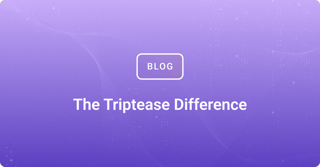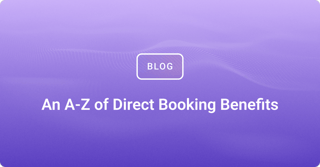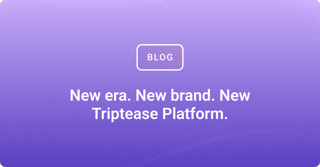“If I was starting a hotel from scratch, I’d give all my distribution to OTAs and just concentrate on the guest and their experience.”
That was the view announced by David Turnbull, co-founder of SnapShot, at the Seize Opportunity in Disruption conference in London a few weeks ago.
The comments sparked all the controversy you'd expect from an industry fired up by the Direct Booking movement. Check out the comments section under tnooz’s coverage of the event - people aren't holding back on this one. But thinking in absolute binaries - direct vs OTA, good vs evil - doesn't help anyone, least of all a new hotel. The truth is, creating a successful direct booking strategy means striking a fruitful balance between the two.
At Triptease we believe that Direct is Best. We also believe that featuring on OTAs can lead to more direct bookings in the long run. We don't believe at all that concentrating on direct bookings means taking any focus off the guest and their experience.
We've put together some thoughts on how new hotels can get the best of both worlds.
Make the most of your OTA exposure
Believing that Direct is Best doesn't mean blindly ignoring the value of OTAs. They're a great channel for building brand recognition and incremental revenue.
In fact, many hotels who now have a significant chunk of direct revenue began by handing over the majority of their bookings to OTAs.
So how did they make the switch?
A successful direct booking strategy will make sure that once so-called 'Bookingised' guests reach a hotel, they're turned into direct bookers for their next trip (or even better, forever).
Good in-hotel marketing can incentivise your guests to come straight to you next time. The solutions can be pretty simple, but they make a big difference:
- Offer OTA bookers a special rate code allowing them to book direct at a discount for their next trip
- Reward direct bookers with bonus loyalty programme points
- Train staff to always mention the perks of booking direct when checking guests in
Getting creative with your guest engagement can reap serious rewards for your direct booking strategy. Putting real effort into building relationships with guests is mutually beneficial: they have a better travel experience, while you increase your chances of winning them back from the OTA for their next booking.
When it comes to data, follow the lead of the OTAs
It's still the case that a hotel's digital communications typically only begin once a guest has checked out. By that point, valuable on-site time has been lost to interact with that guest and provide them with a premium experience.
Turnbull makes the point that for his last five hotel check-ins, he was contacted by both TripAdvisor and Booking.com within minutes of arrival with surveys and recommendations. OTAs and meta-searches alike are ploughing time and effort into capturing (and learning from) guest behaviour, but many hotels still have no solutions in place to collect even the most basic data.
Unsurprisingly, a recent white paper from Skift and Amadeus revealed that the majority of hotels still allocate less than 20% of their total IT budget to guest intelligence initiatives.
Investing in guest intelligence doesn't have to mean turning your hotel into the Big Brother house. It can mean using just a few simple tools that make the guest's life easier while teaching you more about what they want from their stay.
On-site digital solutions allow hotels to constantly iterate and improve on guest experience, all while collecting a wealth of data about their profiles and behaviour. These solutions could include survey push messaging like Revinate's, a digital guest directory like SuitePad, or even just a basic digital check-in service.
Whatever you choose, if you're on a budget it's best to go for proven ROI and intuitive analytics features over futuristic and flashy devices. A new hotel is probably going to get more benefit out of 100 meaningful customer surveys than they are out of a robot that serves cocktails (but hey, we could be wrong). When it comes to investment in tech, thoughtful consumer focus wins out over gimmicks.
Make sure your communication is up to scratch
With OTAs and metasearches investing heavily in messaging features - TripAdvisor just launched its messenger bot for user-generated recommendations - it’s important to make sure that you’re the one communicating with your guest during their stay.
Solutions like TravelClick’s recently-launched Guest Messenger feature open a new channel of communication between you and your guest, bringing your customer service right into the palm of their hand. Guests can instantly alert staff to their needs, while the hotel has valuable new opportunities for upsell through push messaging and integrated payment systems.
Paying attention to data and automation doesn't have to mean forgetting the human side of hospitality. In fact, it's data that's going to give you the valuable insight into guest satisfaction that you need to improve customer experience, build your brand, and drive direct.
Putting time and effort into creating a seamless guest experience between the digital and physical sides of your hospitality will give you important leverage over the OTAs in the minds of guests. The hotel stay is where you own the customer: make sure that if they're communicating with anyone, they're communicating with you.
Maximise the conversion power of your website
Hopefully by now we've made it clear that if you're going to build up your direct bookings, you need to get smart about data. Giving all your distribution to OTAs stands in the way of that.
It's much harder to access and learn from guest data if they book through an OTA, and giving those sites all your distribution means handing them a robust picture of your guests that you then have to sketch in for yourself. No guest's experience is improved by having to provide all the information at check-in that they've already given to the website they booked through.
So why feature your hotel on an OTA at all?
Aside from the simple truth that OTAs have a hold on the market that you're really going to struggle without, they also paradoxically open up opportunities for direct bookings that you wouldn't have found otherwise.
The 6.3 million room nights booked on Booking.com every week aren't reserved independently of hotel websites. Prospective guests are often keen to know as much as possible about a property before they make a reservation, and their research will more often than not include checking our the hotel's own site.
It's your job to make sure those guests don't return to the OTA once they land on your page.
Ensuring your site is optimised to convert OTA browsers should be a fundamental part of any direct booking strategy. They provide the traffic, it's up to you to convince that traffic that Direct is Best.
Price check widgets, hi-res images, a well-integrated booking engine, targeted messaging: there are plenty of simple steps a hotel can take to drive website conversion. Check out NetAffinity’s cheat sheet for their tips on generating bookings through your landing page. And don’t forget, most of your potential customers will be coming to you from their mobile - a poorly designed mobile site will cost you conversions, as well as reduce your visibility on Google searches.
Featuring on an OTA doesn’t mean handing them your distribution. A well-thought-out website, built with OTA conversion in mind, allows you to harness their marketing power without giving up ownership of your bookings.
Don't get stuck in the comfort zone
Online travel agencies don’t have to be the enemy. For a new hotel with no visibility among consumers, they’re a great marketing channel - they'll drive incremental revenue, gain you online traction, and build your brand name recognition. Once the guest arrives at your hotel - or lands on your website - it’s your job to turn them into a direct booker for next time.
As Mirai say, ‘if your relationship with OTAs is fabulous and full of joy, that’s because you are still in the comfort zone, a zone where they win and you lose, or don’t win as much as you should.’ Giving OTAs your distribution to start with can work well, but it’s important to think of this as a short-term strategy that will allow you to start focusing on building direct.
Are you a new hotel? We’d love to hear how you manage your relationship with the OTAs - get in touch with us here to share your wisdom.
Lily is Lead Product Marketing Manager at Triptease. When she's not investigating the industry or spreading the word that #DirectIsBest, she enjoys music, cycling, and obscure radio quiz shows.








